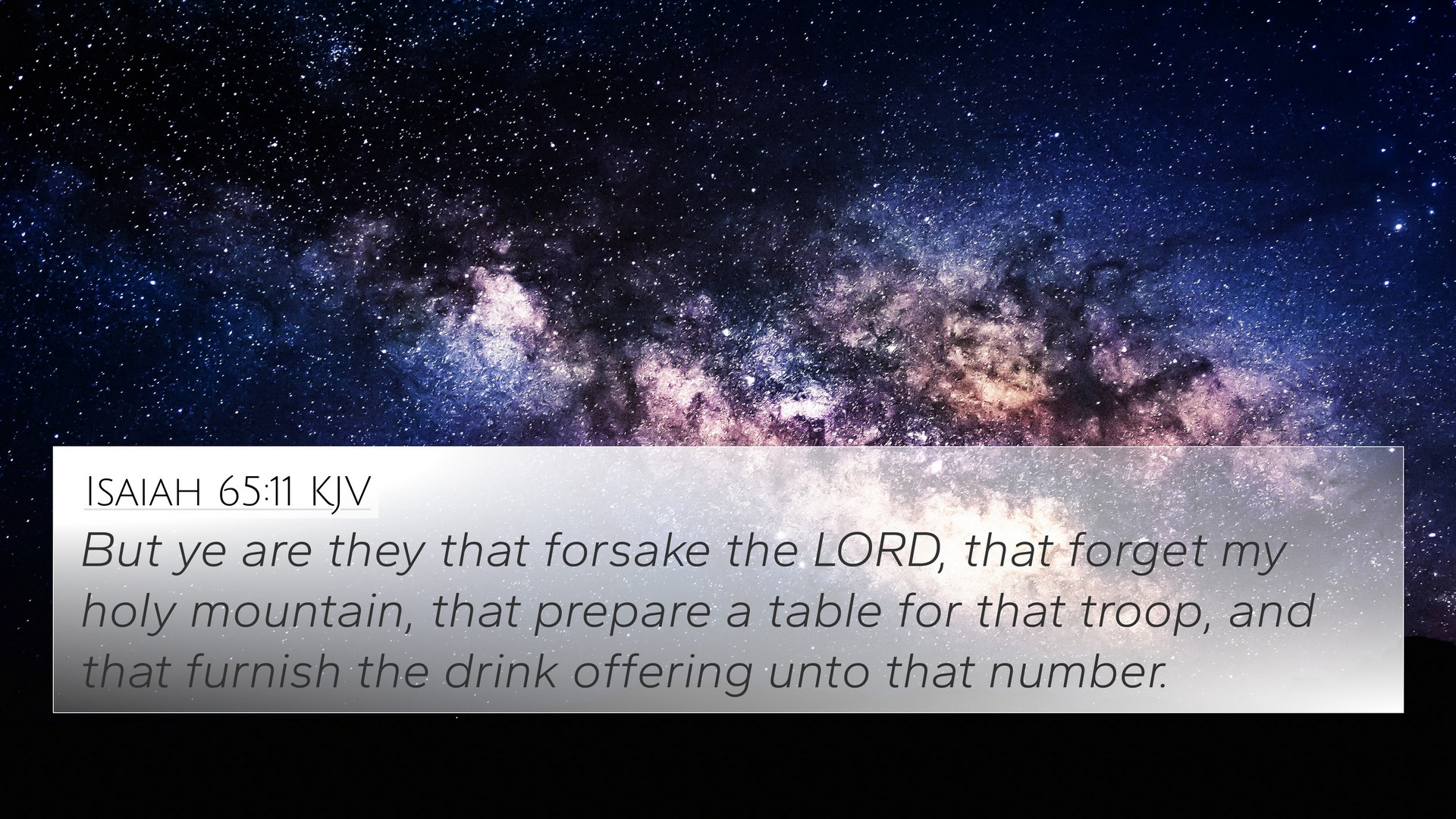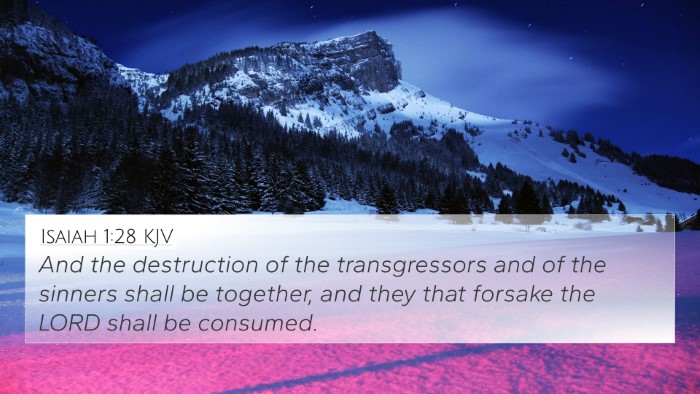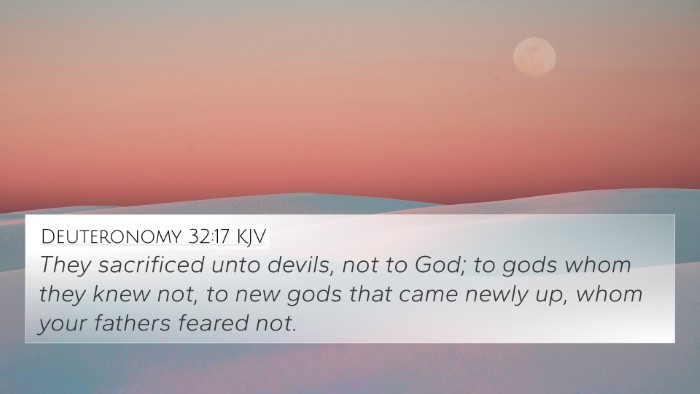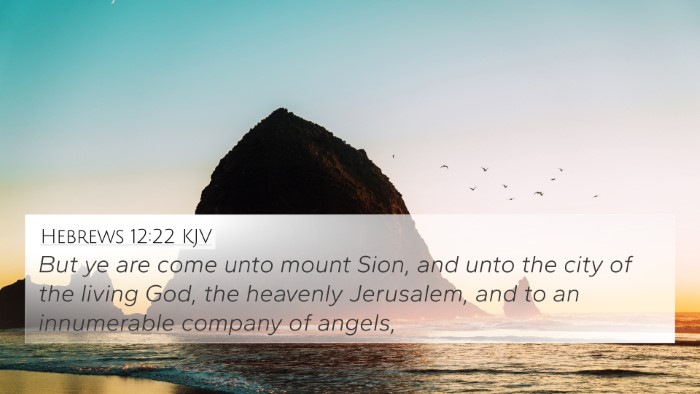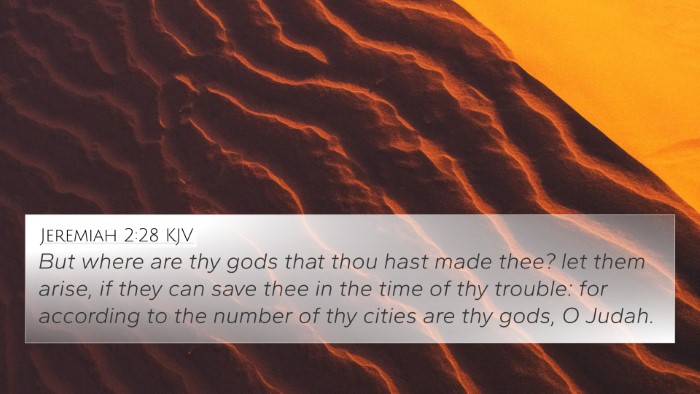Understanding Isaiah 65:11
Isaiah 65:11 states, "But you who forsake the LORD, who forget my holy mountain, who set a table for Fortune and fill bowls of mixed wine for Destiny." This verse addresses the consequences of turning away from God, revealing the fate of those who abandon His ways.
Contextual Background
The Book of Isaiah primarily focuses on the themes of judgment and redemption. This particular chapter is a message from God to the Israelites, highlighting their failures and the resultant divine response. The Lord contrasts His faithful servants with those who neglect Him.
Commentary Insights
- Matthew Henry: Henry elaborates that this verse illustrates the deep spiritual neglect of Israel. The act of "setting a table for Fortune" indicates idolatry and reliance on false gods, leading to their downfall.
- Albert Barnes: Barnes connects this verse to the broader theme of divine retribution. He notes that the worship of false gods, represented here by "Fortune" and "Destiny," signifies Israel's abandonment of true worship, which ultimately results in their separation from God.
- Adam Clarke: Clarke emphasizes the metaphorical implications. He suggests that "Fortune" and "Destiny" symbolize the pursuits of materialism and human pride, contrasting sharply with the spiritual blessings that come from fidelity to God.
Thematic Connections
This verse serves as a cautionary message regarding the dangers of idolatry, both historical and modern. It evokes themes such as:
- Spiritual abandonment
- Consequences of idolatry
- The contrast between divine providence and human ambition
Cross-Referencing Biblical Texts
To gain a deeper understanding of Isaiah 65:11, here are several related verses that provide insights into its themes:
- Jeremiah 44:17-18: Discusses the people's dedication to idolatrous practices despite the consequences.
- Deuteronomy 32:17: Warns against sacrifice to false gods, highlighting the spiritual dangers.
- Psalm 106:36: Reflects Israel’s tendency to worship the idols of the nations, leading to their downfall.
- Hosea 2:8: Shows the disconnection from God due to material pursuits and worship of false idols.
- Revelation 3:16: Calls out the lukewarmness of faith, linking to the themes of neglecting God's path.
- 1 John 2:15: Advises against loving the world, similar to forsaking God for material gains.
- Matthew 6:24: Stresses that one cannot serve both God and wealth, emphasizing the choice between divine and worldly pursuits.
- Isaiah 30:1: Warns against seeking counsel apart from God, illustrating the issue of reliance on human wisdom over divine guidance.
- Romans 1:25: Describes the consequences of exchanging the truth of God for a lie, applicable to the practices mentioned in Isaiah.
- Galatians 6:7: Affirms the principle that one reaps what they sow, a theme echoed in Isaiah's warnings.
Application and Reflection
In reflecting on Isaiah 65:11, one must consider the modern parallels of idolatry. What aspects of contemporary life might we be tempted to prioritize over our relationship with God? This verse encourages self-examination and commitment to a faithful spiritual life.
Resources for Deeper Study
For those looking to conduct Bible cross-reference studies, consider tools such as:
- Bible concordance to find word connections and themes.
- Cross-reference Bible study guides that offer insights into related verses.
- Bible reference resources for identifying parallels in scripture.
Conclusion
Isaiah 65:11 serves as a potent reminder of the consequences of forsaking God. The insights gathered through cross-referencing and studying other related passages deepen our understanding and encourage a more profound commitment to following the Lord in faithfulness.
